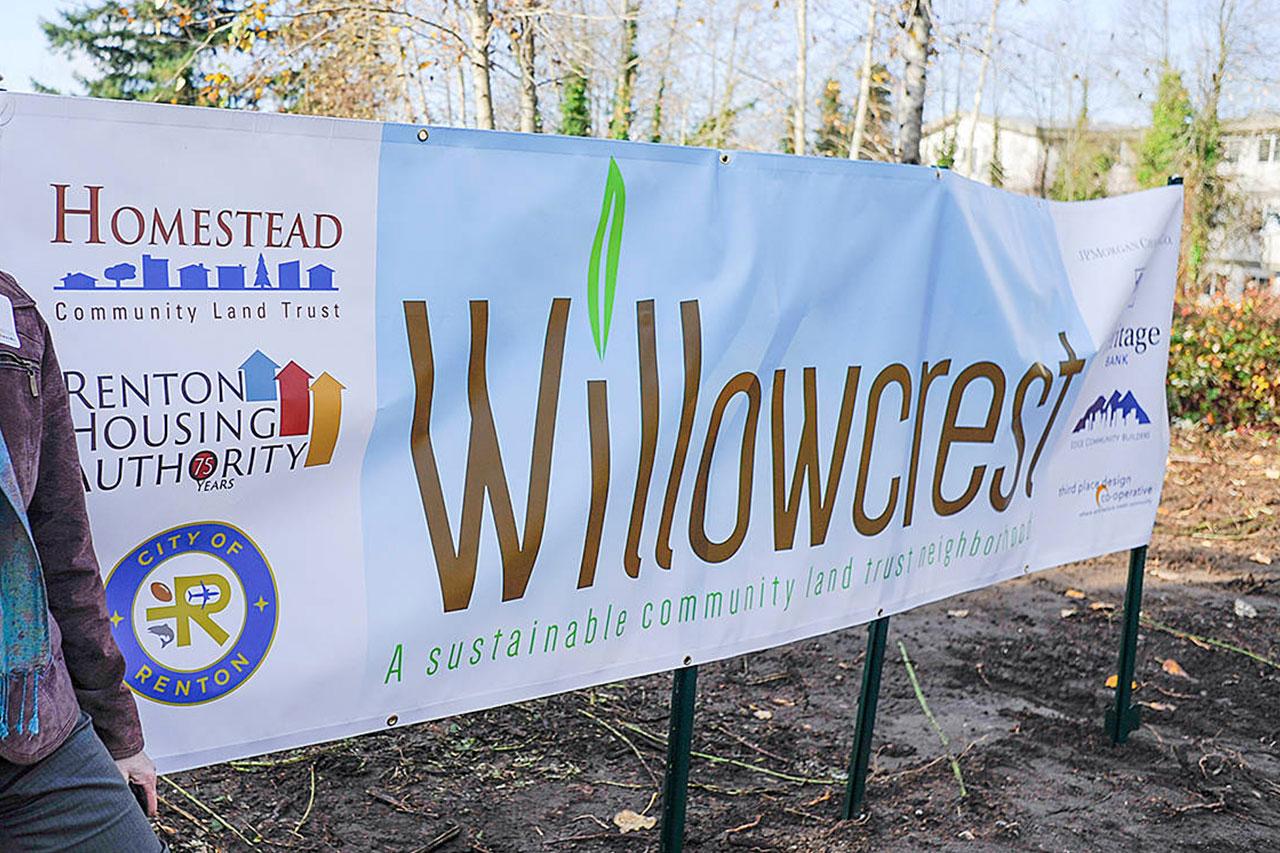The first of its kind, a town home project in Renton’s Sunset neighborhood is trying to prove that affordability and sustainability can be interconnected.
“For too long, people have framed affordability and sustainability as competing priorities. We simply don’t have time for that kind of thinking anymore. We don’t have time to wait for either,” Homestead Community Land Trust Executive Director Kathleen Hosfeld said.
On Nov. 20, Homestead broke ground on a net-zero energy town home for moderate-to-low income homeowners in Renton. Net-zero energy buildings reduce greenhouse gasses and create more renewable energy than they use. These homes are built with materials that keep utility costs low, and use no fossil fuel-powered stoves or heaters. All the electricity in the home is powered by solar panels on the roof of each building.
The 12 town homes, four three-bedrooms and three four-bedrooms, will be priced below $315,000. The resident owns the structure, while Homestead Land Trust maintains ownership of the land, making sure the homes are affordable permanently. Each unit can then be resold up to seven times over a 50 year period.
A homeowner at another Homestead location in Seattle spoke at the groundbreaking about the relief and security of going from Seattle renters to homeowners.
“We were suddenly thrown out into what had become a really competitive and expensive rental market,” Susan Zeman said. “It’s hard to put into words the vulnerability that working-class renters live with in our region, as we are pushed farther and farther from our communities and our jobs.”
Willowcrest will be eligible for first-time home buyers within 50-80 percent of the area median income (AMI), as determined by Housing and Urban Development (HUD). As of November 2019, for example, the buyer’s monthly gross household income cannot be more than $7,354 for a household of four.
This is the first of Homestead’s projects that is net-zero energy and outside of Seattle. This has been a goal for the land trust for about four years, the idea based off zHome in Issaquah — the first zero-net energy town home in the US in 2015. Hosfeld said she had talked with King County Green Tools’ Patti Southard, who passed away last year, about zHome and dreamed of replicating it for low-to-moderate income homebuyers.
Renton Housing Authority (RHA) contributed the land to the project, located off Glennwood Avenue Northeast behind the existing RHA project Glenndale Townhomes. RHA Director Mark Gropper said they bought the land about 15 years ago, with no idea what to do with it. Now they’ve been able to support to people displaced from the old Sunset Terrace Apartments and Willowcrest. He also hopes that the remaining unused land can be used for more Homestead net-zero town homes.
“The RHA has been so impressed with the thoughtful, socially-just approach from Homestead that we have, in principle, dedicated the second half of this lot to 14 more town homes,” Gropper said. “That’s 26 units of sustainable, affordable housing.”
Mayor Denis Law spoke at the ground breaking about the partnerships that help projects like this happen in Renton, including the work of the Renton Housing Authority. Creating more types of housing has been a goal for the city for the low-income residents, and Willowcrest provides an investment in the Sunset area which matches with the goals of the Sunset Area Revitalization Plan.
He also touched on how he’s seen Renton change in his time in office, to a place that’s no longer affordable for those who want to work and live in the city and county.
“It’s unbelievable to see the gentrification taking place in King County. And trying to figure out how people who work in King County can actually live in King County,” Law said. “Home ownership is becoming a thing of the past, and it’s scary for young people trying to get started and get some housing. This has become a priority for the city council— to find creative ways to build quality housing that meets low-to-medium income levels.”
The city of Renton will also be awarding Willowcrest with a $25,000 Housing Opportunity Fund Grant award and a $332,000 Density Fee Grant award, pending council approval at the Nov. 25 city council meeting.
King County awarded Willowcrest with $500,000 in transit-oriented development funds, and includes assisting Willowcrest as part of its commitment to completing 10 Zero Energy Certified projects in 2020. King County Executive Dow Constantine stated in a press release that the county is on track to surpass it’s goal with 12 project set to be complete. The projects show it’s possible to tackle climate pollution, reduce utility bills and bring the benefits of green buildings to residents across the region. Hosfeld also announced at the ground breaking that the Willowcrest project had just received a WaterWorks grant from the county for $180,000 for the project’s storm and rainwater systems.
Both Hosfeld and Catherine Martin, JP Morgan Chase & Co. vice president for global philanthropy in the Pacific Northwest that awarded a foundation grant to the project, both spoke about the history of the land being built on, and acknowledged that it is the occupied territory of the Puget Sound Salish peoples, that have been stewarding the land and practicing sustainability since long before this net-zero energy building.
“This is sacred Salish property. We have to pay respect to the land we are on,” Martin said. “This is rooted in the deep, deep history for tens of thousands of years for the ancestors of the Salish people. They’re in the trees, in the air, in the environment here. So having this deep commitment to deep green sustainability is deeply impactful, both to residents, community and greater Puget Sound.”
Construction is scheduled to be finished by December 2020. Anyone interested in applying to be a homeowner through Homestead can find more information at homesteadclt.org/become-a-homeowner.
This was originally posted on the Renton Reporter by Haley Ausbun.



